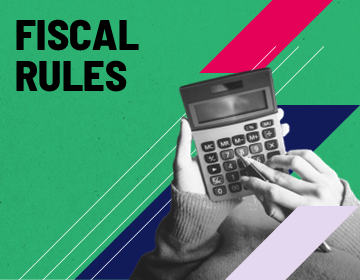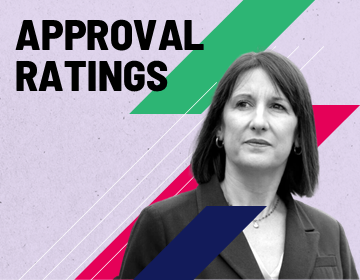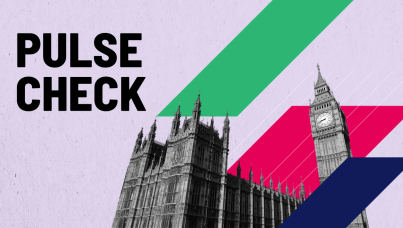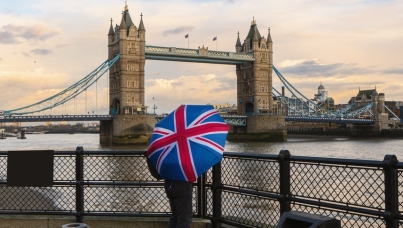Pulse Check - June 2025 Spending Review
Checking the pulse of the nation
-

Breaking fiscal rules?
While awareness of Chancellor Rachel Reeves’ fiscal rules is low, the public are on balance supportive of them (although few think it likely that they will be met). However, two in five (40%) say it would be a good thing for her to break them if it leads to more money for public services – though support for breaking the rules diminishes dramatically if it means higher taxes (down to 15%).
Click here -

Reeves’ approval ratings mirror Kwarteng’s post mini-budget
Half of Britons (51%) think Rachel Reeves is doing a bad job as Chancellor, and just 16% are positive – ratings very similar to Kwasi Kwarteng just after the 2022 mini-budget. Labour still has a small lead as most trusted on the economy and public services, but Reform UK are not far behind.
Click here -

Low economic optimism continues
Ipsos' Economic Optimism Index has run regularly since 1978, providing 47 years of data about Britons’ economic confidence. The latest results show 15% think the economy will improve, and 63% get worse, giving a net figure of -48. This has rebounded somewhat from the historic low of -68 seen in April after the tariffs, but is still well below the long-term average of -17.
Click here

The Ipsos Spending Review Briefing
Earlier this week, we hosted Ipsos' second Beyond the Bubble webinar of the year which brought together expert voices on economics, public finances and public opinion to explore what’s at stake in the imminent government Spending Review. Watch the webinar here.
Here are the key takeaways:
Chaired by Trinh Tu, UK Managing Director of Public Affairs for Ipsos in the UK, the event framed the upcoming review as a moment of both urgency and opportunity. Amidst global volatility and public exhaustion, Trinh stressed how the Government need to balance long-term issues with public reassurance.
The big picture: A country stuck in slow gear
James Smith, Research Director at the Resolution Foundation, set the economic scene with a sobering overview. The UK’s underlying challenge isn’t new, it’s growth, or the lack thereof. However, James highlighted recent signs of economic momentum: -0.7% growth in Q1 2025, new trade deals, and more spending already announced. This offers the Government an opportunity to tell a more optimistic story, but hard choices still need to be taken.
Public expectations and Labour’s tightrope
Gideon Skinner, Senior Director of UK Politics at Ipsos, then delivered fresh polling data that set out the political minefield ahead. Public sentiment is gloomy as 54% of Britons think we are currently in austerity, with expectations of tax rises going up but the positive quid pro quo of more spending on public services going down.
When it comes to public services specifically, the public puts the NHS in clear first place as a priority for more spending (63%), followed by border and immigration control (25%). But even on the NHS, support for spending increases is qualified. Most want the NHS protected, but only through efficiencies, not by harming the quality of other public services. Around 45% believe this is possible, yet many are sceptical about whether such painless savings would really be delivered.
Voters want "a way out of the hole" with tangible improvements to the cost of living, public services and the economy, but are split right down the middle on the key trade-offs involved - higher spending vs lower taxes or borrowing. This is the Government’s dilemma.
Key decisions: The hard choices ahead
Next, Ben Zaranko, Associate Director at the Institute for Fiscal Studies (IFS), walked us through the maths and balancing act required of the Spending Review. At the heart of this are decisions on spending on the NHS and defence, and the consequences that will have on spending on other public services.
Ben floated two possible paths forward:
- Efficiency and productivity improvements – Investing to do more with less is of course sensible and should be pursued, but has realistic limitations. Not all public services can be automated.
- Actual cuts – Shrinking or eliminating services, a politically painful but sometimes unavoidable step when budgets are tight.
While the Government has relaxed its fiscal rules to enable more investment borrowing, prioritisation remains unavoidable.
Health vs. distributional fairness
The discussion returned to James Smith, who honed in on one of the most weighty questions at the heart of this Spending Review: who benefits from government spending?
The Government is currently facing a trade-off - a choice between focusing mainly on boosting NHS spending, or using some of that money to make a more targeted difference for low- and middle-income families. To boost living standards, especially for those left behind, it needs to consider redistributive investment not just universal health spending.
Looking ahead
The Ipsos webinar made clear that the upcoming Spending Review is about far more than spreadsheets. It’s about big, value-driven, society-shaping choices. As our experts pointed out, while there is still scope for the Government to deliver some good news, with the current less than positive public mood towards Labour, the pressure to get these decisions right has never been higher.







